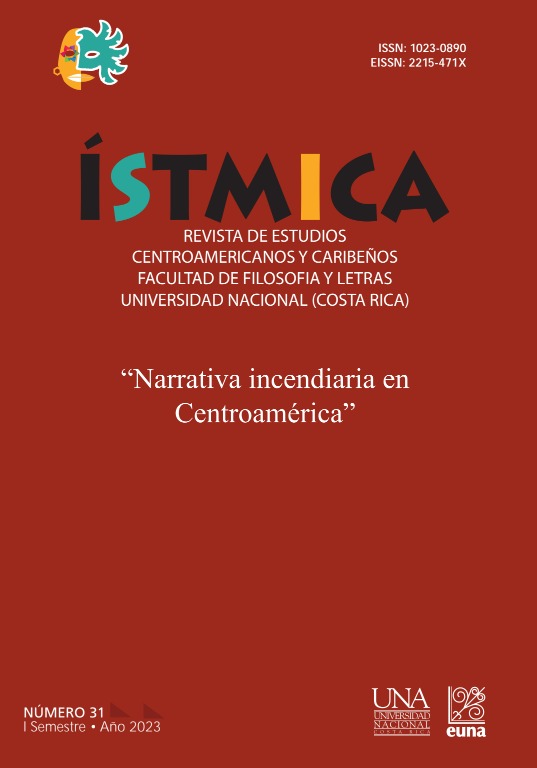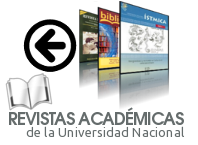The monstrous as a strategy for the rupture of social conventions and the construction of femininity in the stories “Costumbres pre-matrimoniales” and “Sin remitente” by Jacinta Escudos
DOI:
https://doi.org/10.15359/istmica.31.4Keywords:
monstrous, femininity, mask, female body, identityAbstract
This research analyzes the stories “Costumbres pre-matrimoniales” and “Sin remitente” by Jacinta Escudos, in which there are two characters, ‘The mother’ and Anabell, respectively, who have monstrous characteristics and behaviors that they adopt in order to oppose and fight against the rules of a society that invalidate them as human beings. Thus, the concept of monster will be understood as a way of denominating that which is outside the norm, but also as an opportunity for the subjects to experience processes of self-knowledge about their bodies that go beyond what is expected of them. In this case, through the acquisition of masks and “violent” behaviors, these female characters transgress regulatory ideals and propose a new femininity that does not limit their sexual freedom, nor classify them in gender or age stereotypes, so they are not defined as mere objects subordinated to the actions of those around them.
References
Bosch Fiol, Esperança, Ferrer Pérez, Victòria A., Gili Planas, Margarita. Historia de la misoginia. España: Anthropos. 1999.
Cano, Arantxa Alonso. <>. En FILMHISTORIA Online (2012). https://revistes.ub.edu/index.php/filmhistoria/article/view/13906/17216
Chevalier, Jean, Gheerbrant, Alan. Diccionario de los símbolos. Barcelona: Editorial Herder. 1986.
Escudos, Jacinta. Cuentos sucios. San Salvador: Dirección de Publicaciones e Impresos. 1997.
Gabriela Cabal. <>. En Feminismo. Ciencia, cultura y sociedad, 111-128. Edición de Nené Reynoso, Ana Sampaolesi, Susana E. Sommer. Buenos Aires: Editorial Humanitas. 1992.
Gilbert, Sandra. M., Gubar, Susan. La loca del desván: la escritora y la imaginación literaria del siglo XIX. España: Cátedra. 1998.
Giorgi, Gabriel. <>. En Revista Iberoamericana (2009): 323-329.
Herra, Rafael Ángel. Lo monstruoso y lo bello. San José, Costa Rica: Editorial UCR. 2015.
Learned, Amber. El erotismo como logro del movimiento feminista en Centroamérica: los casos de Ana Istarú, Dina Posada y Jacinta Escudos. Tesis de Maestría, Universidad de Saskatchewan. 2008.
Mackenbach, Werner, Ortiz Wallner, Alexandra. <>. En Istmo (2005). http://istmo.denison.edu/n10/foro/escudos.html
Mirande, María Eduarda. <>. En Cuadernos de la Facultad de Humanidades y Ciencias Sociales- Universidad Nacional de Jujuy(2001): 83-93.
Raquel García Alguacil. Edadismo: estereotipos asociados a la edad. https://www.albertia.es/edadismo-estereotipos-asociados-edad-en-residencias/ (consultada 13 de febrero 2021).
Rojas González, José Pablo. <>. En Istmo (2011). http://istmo.denison.edu/n22/proyectos/03.html
Ruiz, Hilda Gairaud. <>. En Revista de Filología y Lingüística de la Universidad de Costa Rica (2016): 259-267.
Valverde Brenes, Francisco J. <>. En Revista de Filosofía de la Universidad de Costa Rica (1995): 41-48
Published
How to Cite
Issue
Section
License
Las personas autoras que publiquen en esta revista permiten cesión gratuita, exclusiva, de ámbito mundial de sus derechos de autoría a la Universidad Nacional (Costa Rica), conservando únicamente sus derechos morales sobre la obra publicada.
Los artículos pueden ser citados y copiados, citando a la persona autora y la fuente. Todos los artículos publicados en la Revista Ístmica están protegidos bajo una Licencia Creative Commons Atribución-NoComercial-CompartirIgual 4.0 Internacional








